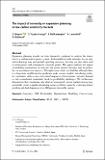The impact of convexity on expansion planning in low-carbon electricity markets
Author(s)
Wogrin, S.; Tejada-Arango, D.; Delikaraoglou, S.; Lamadrid, A.; Botterud, A.
Download11750_2022_Article_626.pdf (790.6Kb)
Publisher with Creative Commons License
Publisher with Creative Commons License
Creative Commons Attribution
Terms of use
Metadata
Show full item recordAbstract
Abstract
Expansion planning models are tools frequently employed to analyze the transition to a carbon-neutral power system. Such models provide estimates for an optimal technology mix and optimal operating decisions, but they are also often used to obtain prices and subsequently calculate profits. This paper analyzes the impact of modeling assumptions on convexity for power system outcomes and, in particular, on investment cost recovery. Through a case study, we find that although there is a long-term equilibrium for producers under convex models, introducing realistic constraints, such as non-convexities/lumpiness of investments, inelastic demand or unit commitment constraints, leads to profitability challenges. We furthermore demonstrate that considering only short-term marginal costs in market-clearing may potentially create a significant missing-money problem caused by a missing-market problem and dual degeneracy in a 100 percent renewable system.
Date issued
2022-06-08Department
Massachusetts Institute of Technology. Laboratory for Information and Decision SystemsPublisher
Springer Berlin Heidelberg
Citation
Wogrin, S., Tejada-Arango, D., Delikaraoglou, S., Lamadrid, A. and Botterud, A. 2022. "The impact of convexity on expansion planning in low-carbon electricity markets."
Version: Final published version